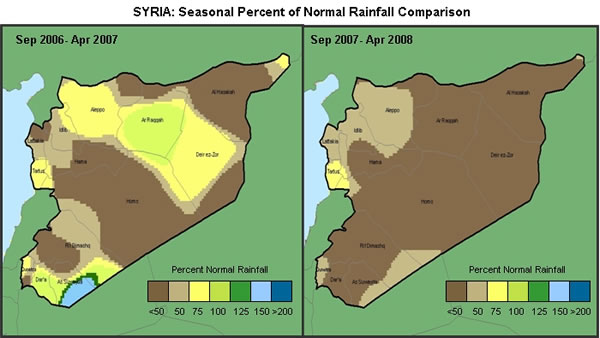Image:US Department of Agriculture www.pecad.fas.usda.gov

Via the Toronto Star:
A new report by the Center for Climate and Security has added evidence to suspicions that climate change played a role in sparking Syria’s revolution.
Immediately before political demonstrations began in the now war-torn nation, Syria’s economy had been ravaged by a historic, five-year drought. Citing NOAA and USDA statistics, the report claims the drought was unusual for the region. A NOAA analysis concluded climate change was a cause of the rain shortage.
As many as 800,000 Syrian farmers lost their livelihoods in the disaster, when “from 2006 to 2011 up to 60 percent of Syria’s land experienced, in the terms of one expert, ‘the worst long-term drought and most severe set of crop failures since agricultural civilizations began in the Fertile Crescent many millennia ago.'”
The crop failures caused a massive migration from rural towns to Syria’s cities, with as many as 200 towns virtually emptying in one region. By 2011, as Arab Spring revolutions took hold in Tunisia, Egypt and Libya, Syria’s important agricultural sector was a shambles. A mass migration, and its attendant tensions, resulted. From the report:
Rural-urban population movements throughout the course of the recent droughts have placed significant strains on Syria’s economically depressed cities, which incidentally have their own water-infrastructure deficiencies. The poor have been forced to compete with other poor communities—not just for scarce employment opportunities but also for access to water resources.
The demonstrations that began in Syria appear to have taken root first in communities suffering worst from the drought, where assistance from the Assad government was insufficient:
The role of disaffected rural communities in the Syrian opposition movement has been prominent compared to their equivalents in other Arab Spring countries. Indeed, the rural farming town of Dara’a was the focal point for protests in the early stages of the opposition movement in 2011 —a place that was especially hard hit by five years of drought and water scarcity and got little assistance from the Assad regime.


